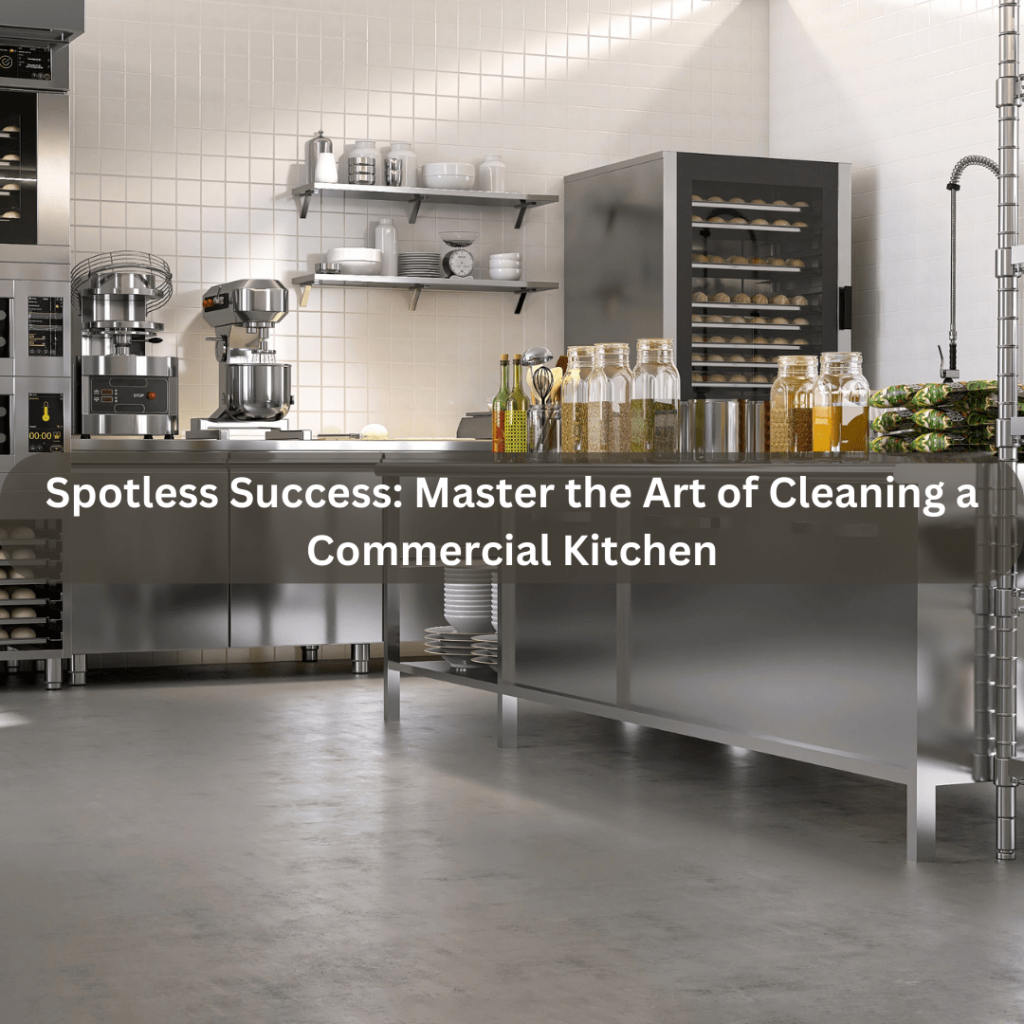Introduction For How To Clean A Commercial Kitchen
Maintaining a pristine and sanitary environment in a commercial kitchen is paramount for ensuring food safety, adhering to health standards, and creating a conducive workspace. A comprehensive cleaning routine not only enhances the longevity of equipment but also contributes to the overall efficiency and reputation of the establishment.
In this guide, we will delve into the essential aspects of cleaning a commercial kitchen, covering everything from daily tasks to periodic deep cleaning procedures. Whether you’re a restaurant owner, kitchen manager, or part of the kitchen staff, understanding the importance of a meticulous cleaning regimen is key to running a successful and hygienic culinary operation.
Q1: How often should I clean a commercial kitchen?
A1: Daily cleaning is essential in a commercial kitchen, with deep cleaning scheduled regularly, typically monthly.
Q2: What areas should be a priority during daily cleaning?
A2: Focus on high-touch surfaces, cooking equipment, countertops, and floors during daily cleaning.
Q3: How can I clean stainless steel surfaces in a commercial kitchen?
A3: Use a mixture of water and mild detergent to clean stainless steel surfaces, followed by a stainless steel cleaner for shine.
Q4: What’s the best way to clean commercial kitchen floors?
A4: Sweep or vacuum debris, mop with a degreaser, and regularly use a floor scrubber for deep cleaning.
Q5: How do I clean commercial kitchen exhaust hoods?
A5: Regularly wipe down the exterior and schedule professional deep cleaning for the exhaust hood and ductwork.
Q6: Can I use bleach for sanitizing surfaces in a commercial kitchen?
A6: Yes, a bleach solution (1 tablespoon bleach per gallon of water) is effective for sanitizing surfaces in a commercial kitchen.
Q7: How do I clean commercial kitchen grills and griddles?
A7: Scrape off debris, use a grill stone for stubborn residue, and wipe with a damp cloth.
Q8: What’s the recommended method for cleaning deep fryers?
A8: Drain oil, scrub the fryer with a degreasing solution, and regularly replace oil following the manufacturer’s guidelines.
Q9: How do I maintain cleanliness in food storage areas?
A9: Regularly organize, rotate, and clean food storage shelves, bins, and containers to prevent contamination.
Q10: Can I use vinegar for cleaning in a commercial kitchen?
A10: While vinegar can be effective for certain surfaces, commercial kitchens often require stronger cleaning agents for thorough sanitation.
Q11: How do I prevent grease buildup on kitchen surfaces?
A11: Wipe down surfaces regularly, use degreasing agents, and schedule deep cleaning to prevent grease buildup.
Q12: What’s the best way to clean commercial kitchen cutting boards?
A12: Wash cutting boards with hot, soapy water, sanitize with a bleach solution, and air-dry thoroughly.
Q13: Should I clean kitchen equipment daily, even if it’s not used often?
A13: Yes, regular cleaning prevents dust, grease, and potential contamination even for less frequently used equipment.
Q14: How do I clean commercial kitchen dishwashers?
A14: Run dishwasher cleaning tablets or a vinegar solution through a cycle to remove built-up residue.
Q15: Can I use steam cleaning in a commercial kitchen?
A15: Yes, steam cleaning is effective for sanitizing various surfaces in a commercial kitchen, especially grills and ovens.
Q16: How do I clean commercial kitchen ventilation systems?
A16: Schedule professional cleaning for ventilation hoods, ducts, and fans to maintain optimal air quality and safety.
Q17: What’s the recommended cleaning routine for ovens and ranges?
A17: Wipe down surfaces daily, use oven cleaner for stubborn stains, and schedule deep cleaning periodically.
Q18: How can I minimize odors in a commercial kitchen during cleaning?
A18: Use baking soda, citrus-based cleaners, or commercial deodorizers to combat lingering odors.
Q19: Can I clean kitchen utensils in a dishwasher?
A19: Yes, most kitchen utensils can be safely cleaned in a commercial dishwasher, following the manufacturer’s guidelines.
Q20: Is it essential to train kitchen staff on proper cleaning procedures?
A20: Yes, proper training ensures a consistent and effective cleaning routine, maintaining a safe and sanitary commercial kitchen environment.
Conclusion On How To Clean A Commercial Kitchen
As we conclude our exploration into the meticulous task of cleaning a commercial kitchen, envision a space where hygiene is prioritized, and culinary creativity flourishes in a clean and organized environment. From the routine wiping down of surfaces to the systematic deep cleaning of appliances and ventilation systems, each task plays a crucial role in maintaining the highest standards of cleanliness.
By implementing these cleaning practices diligently, commercial kitchens can not only comply with health regulations but also create a positive and inviting atmosphere for both staff and patrons. Here’s to a commercial kitchen that shines with cleanliness, ensuring not only the quality of the dishes served but also the well-being of everyone involved in the culinary journey.



